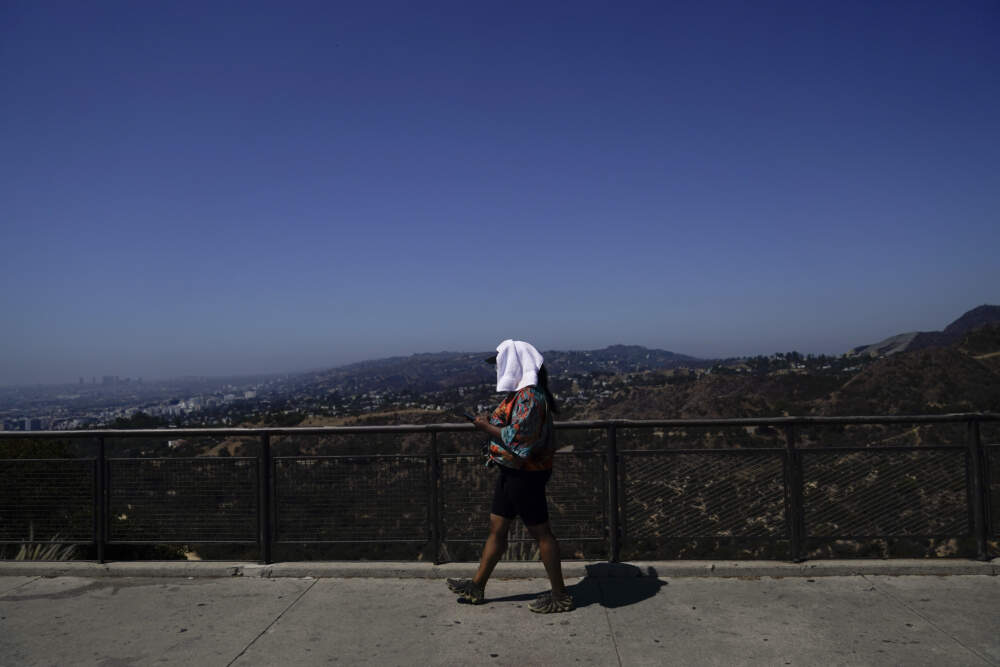Advertisement
'The Heat Will Kill You First': How extreme heat will change the world

Editor's note: This segment was rebroadcasted on April 22, 2024. Find that audio here.
Rising heat is the most direct and potentially deadly effect of climate change. Extreme heat has hit the South with temperatures reaching 115 degrees. In Texas, the power grid is once again nearing a breaking point amid summer heat.
Journalist Jeff Goodell explores extreme heat in his new book, “The Heat Will Kill You First: Life and Death on a Scorched Planet." Goodell examines the science behind climbing temperatures what to do when "the sun feels like the barrel of a gun pointed at you.”
In 2019, more people died from extreme heat than from gun violence or illegal drugs. Goodell says that human bodies are not equipped to deal with extreme temperatures.
“Our heart starts beating faster and faster as it's frantically trying to push blood around to the surface of our skin so that it can be cooled off,” he says. “The lining of your intestines begins to fall apart. As the heat rises inside your body, at a certain point, the actual membranes of your cells begin to melt and your body really begins to unravel from the inside.”
But deaths caused by extreme heat aren’t always easy to discern, Goodell says. People suffer heart attacks and other conditions with an underlying cause of heat exposure.
Goodell also unpacks the history and science behind cooling and air conditioning. He explains a divide between people who can afford air conditioning and those who cannot, including stories of people living in places where they cannot access air conditioning in the book. Goodell also notes that A/C uses up an absorbent amount of energy, enough to crash power grids and cause blackouts in some instances. Modern ways of dealing with rising temperatures actually contribute to more irreversible warming, Goodell says.
“Even if, by some miracle, we went to zero emissions of carbon dioxide tomorrow,” he says. “it would not cool off the atmosphere. It would only stop the warming.”
Book excerpt: 'The Heat Will Kill You First: Life and Death on a Scorched Planet'
By Jeff Goodell
1. A Cautionary Tale
When the babysitter arrived to take care of Miju at around 11 a.m. on Monday, August 16, 2021, she was surprised to find the house empty. Miju was the one-year-old daughter of Jonathan Gerrish and Ellen Chung, who had recently fled the Bay Area to start a new life in California’s Sierra Nevada foothills, not far from the old Gold Rush town of Mariposa. Their modern three-bedroom house sat on ten acres of lightly forested land. It had wood floors and a big stone chimney and tall rectangular windows that looked over a rugged treeless canyon called Devil’s Gulch. From the second-floor bedroom, you could just see the top of El Capitan, the iconic granite formation in Yosemite Valley, about thirty-five miles to the east. The house was their refuge from the hustle of Silicon Valley, where Gerrish worked as a software engineerat Snapchat, the instant messaging app company.
Advertisement
The babysitter, who had a key, let herself in and called out their names. No response. It had been a hot weekend, but the inside of the house was cool, thanks to the air conditioner, which was going strong. Oddly, Chung and Gerrish had left behind their wallets. Even more confusing, the diaper bag that the couple always took with them was there.
The babysitter had last seen them the previous Friday when she had finished straightening up the house. That evening, Chung had happily texted her a video of Miju starting to walk. She had made no mention of plans to be away that Monday. Gerrish and Chung, who doted on Miju and seemed deliriously happy with their new life in the Sierra foothills, were not the kind of people who would disappear for a last-minute road trip to Las Vegas.
Worried, the babysitter called the construction manager who was working with Gerrish on another home he owned, and who she knew was in frequent contact with him. The construction manager was not initially concerned because Chung and Gerrish were a “very active family,” an investigator later wrote in the police report. Nevertheless, the babysitter and the construction manager started making calls and sending texts to friends, asking if anyone had seen the couple. Steve Jeffe, a friend who lived in Mariposa, posted on Facebook: “Hi, please has anyone been in contact with Jonny Gerrish or Ellen Chung in the last two days .. Please.” By 5 p.m. that day, several friends began driving around looking for the family. At 11 p.m., they called the Mariposa County sheriff.
A few hours later, a deputy sheriff found Gerrish’s truck at the Hites Cove trailhead a few miles from their home. By 4 a.m., a search and rescue team was on the scene. They headed down the trail in an ATV, flashlights cutting through the darkness. They radioed back that they had found tracks on the trail. But when they followed the tracks down to the Merced River, the tracks disappeared. By that time, the sun was rising. A helicopter was called in. More search and rescue teams arrived. One team headed down a steep trail with numerous switchbacks toward the river. They were about a mile and a half down the trail when, at about 9:30 a.m., they discovered the bodies of Gerrish, Miju, and their dog, Oski. Gerrish was in a seated position, with Miju and Oski beside him.
At first, the search and rescue team saw no sign of Chung. About a half hour later, a deputy walking back up the trail from where Gerrish was found noticed “some disturbed dirt on the uphill side of the trail that appeared that something or someone had tried to go up the hill.” He spotted a shoe, then Chung’s body. Investigators would later conclude that the family had been hiking up the trail when they died. The location of Chung’s body indicated that she had abandoned the trail and was climbing straight up the mountainside— a sign, investigators believed, of the urgency of their situation and her desperate attempt to reach their truck.
But even if Chung had made it to the truck, she might not have been able to get in. During a search of the area, investigators discovered a Ford key fob on the trail about a hundred feet below Gerrish’s body. Had it accidentally fallen out of his pocket? Or did he have it in his hand and drop it and not realize it— perhaps a sign that he had been panicked or disoriented?
Rescuers found no signs of foul play. No marks on the bodies, no obvious signs of struggle. Because of the remote location and the difficulty of the terrain, the bodies could not be removed immediately. Instead, two deputies spent the night at the scene, guarding the bodies from bears and coyotes. The next morning, a California Highway Patrol helicopter airlifted the family off the trail.
Excerpted from the book 'The Heat Will Kill You First' by Jeff Goodell. Copyright © 2023 by Jeff Goodell. Reprinted with permission of Little, Brown and Company. All rights reserved.
Chris Bentley produced and edited this interview for broadcast with Todd Mundt. Grace Griffin adapted it for the web.
This article was originally published on July 03, 2023.
This segment aired on July 3, 2023.

